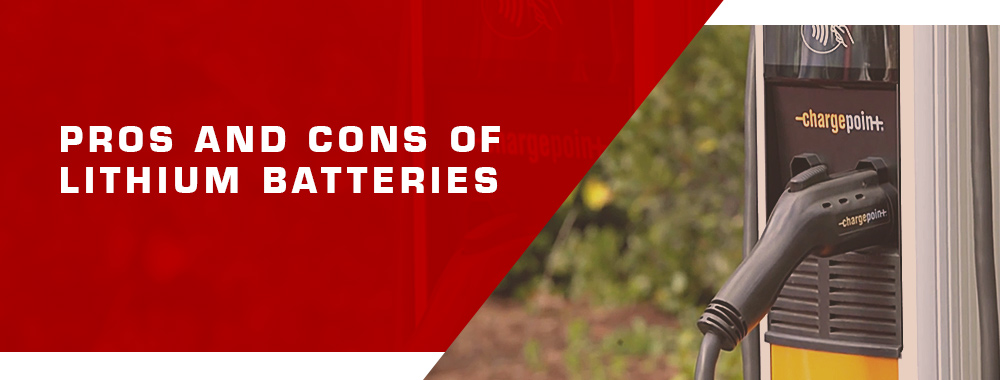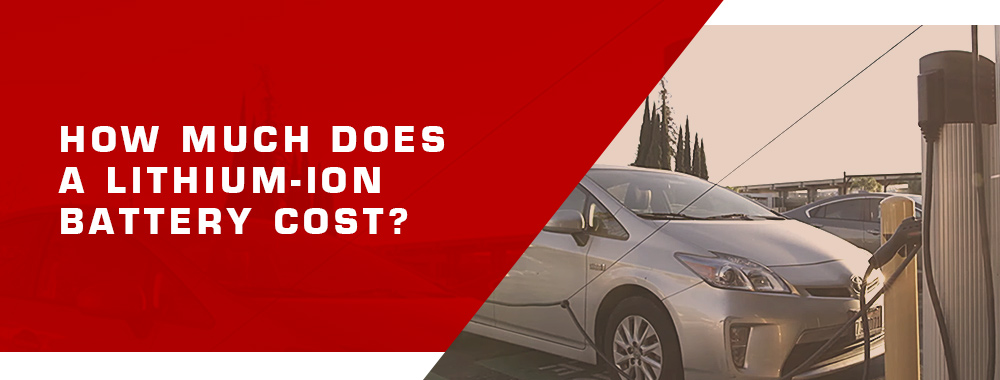What are the main components of lithium-ion batteries?
The four basic components of a lithium-ion battery: the anode, cathode, separator, and electrolyte.
Each individual component of a lithium-ion battery is important. It cannot work if one component is missing.
How does a Li-ion battery work?
The battery consists of an anode, cathode, separator, electrolyte, and two current collectors (positive and negative). The anode and cathode hold lithium. The electrolyte carries positively charged lithium ions from the anode to the cathode and vice versa through the separator. The movement of the lithium ions creates free electrons at the anode, which creates a charge at the positive current collector. An electric current then flows from the current collector through the powered device to the negative collector. The separator blocks the flow of electrons inside the battery.

Lithium batteries have a much higher energy density than other batteries. They can have up to 150 watt-hours (Wh) of energy per kilogram (kg). For comparison, nickel-metal hydride batteries have 60–70 watt-hours/kg. Lead-acid batteries have 25 watt-hours/kg.
They also have a lower discharge rate than others. They lose about 5% of their charge in a month compared to nickel-cadmium (NiMH) batteries, which lose 20% in a month. If your electric car is not used for a long time, learn how to store its battery.
Lithium-ion batteries are also more expensive to produce. They can cost almost 40% more to produce than nickel-cadmium batteries. Lithium-ion batteries for cars are also quite safe.
Is there a better battery than lithium-ion?
Nothing currently compares to the lithium-ion battery. Compared to other technologies, it has a higher energy density, more charge-discharge cycles of the battery pack, a higher charging rate, and it is safer to use. Experts believe that there are still many opportunities to improve such batteries. However, in the future there may be much better batteries than lithium-ion batteries.

The average cost of a lithium-ion battery drops to $130 per kWh in 2020. For a smartphone, a battery costs $2 to $4, but for an electric car, a lithium-ion battery can range from $7,000 to $20,000. However, the price of these batteries has dropped by about 85 percent over the past decade and continues to fall. According to experts, the battery market is dominated by China. The U.S. does not yet have the ability to compete with China, so most batteries are imported from there.
How is the battery charged and discharged?
While the battery is discharging and delivering electrical current, the anode releases lithium ions onto the cathode, creating a flow of electrons from one side to the other. When the device is connected, the opposite happens: lithium ions are released by the cathode and received by the anode.
So, if you are looking for a good and reliable portable EV charger, be sure to check out the models we have selected. We believe that these chargers will meet your needs and help keep your electric car running smoothly. Thanks for reading and don’t forget to charge up before hitting the open road.
What are energy density and power density?
The two most common concepts associated with batteries are energy density and power density. Energy density is measured in watt-hours per kilogram (Wh/kg) and represents the amount of energy a battery can store in relation to its mass. Power density is measured in watts per kilogram (W/kg) and represents the amount of energy a battery can produce in relation to its mass. To paint a clearer picture, imagine draining a swimming pool. The energy density is similar to the size of the pool, and the energy density is comparable to emptying the pool as fast as possible.
The Office of Automotive Technology is working to increase the specific energy of batteries while lowering the cost and maintaining an acceptable power density.
Why is it important to improve battery efficiency?
Improved vehicle efficiency is important to reduce consumer fuel costs, support domestic industry, minimize pollution, and increase energy security.
Americans spend nearly half a billion dollars a day importing oil. In addition, transportation accounts for more than a quarter of the nation’s greenhouse gas emissions.
There is an opinion that charging an electric car with direct current is detrimental to the life of the battery. About this we wrote earlier. To prolong the life of your electric car and its battery think about using a home charging station. Even if you live in an apartment you can use EV charger extension cords. Ideally you should contact the management of the building.
Just replaced the battery in my EV with a lithium-ion one. The difference in performance is like night and day! I used to worry about range, but now it’s a non-issue. Anyone else made a similar upgrade? How was your experience?
I upgraded last year. The improved range is a relief, especially on long trips. Also, I noticed better acceleration. It’s a pricey upgrade but totally worth it for the peace of mind and performance.
Curious about wireless EV charging. Is it just a gimmick or the future of EV charging? Seems convenient, but I wonder about the efficiency and cost. Thoughts?
I think wireless charging has potential, especially for public spaces. Efficiency isn’t on par with wired charging yet, but the tech is evolving. It’s a matter of convenience vs. cost at this point.
Anyone else experiencing reduced range in cold weather? I love my EV, but winter seems to hit the battery hard. How do you guys deal with this?
Yes, winter affects battery performance. I precondition my EV while it’s still plugged in, and it helps. Also, try to keep the battery above 20% charge; it seems to reduce the range drop.
Picking my first EV soon! Excited but overwhelmed. How to choose the right model? Priorities are range, maintenance cost, and reliability. Any recommendations?
Welcome to the EV world! Focus on range if you do a lot of long-distance driving. Most modern EVs are reliable, but do check user reviews for maintenance insights. Good luck!
I’m considering installing solar panels to charge my EV. Love the idea of being energy independent. Anyone with solar charging experience? Is it worth the investment?
Just a reminder to check your EV’s battery health regularly. A healthy battery not only ensures better performance but also contributes to the vehicle’s overall safety.
Good point. I schedule regular check-ups at the service center. They do a thorough battery health assessment. It’s reassuring to know the status of my EV’s battery.